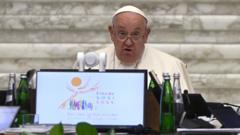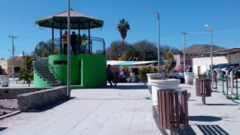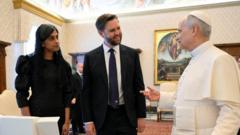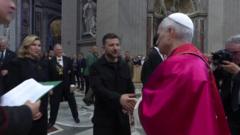The recent synod at the Vatican highlighted the need for increased women's leadership without endorsing their ordination as priests.
Papal Summit Concludes with Focus on Women's Leadership in the Catholic Church

Papal Summit Concludes with Focus on Women's Leadership in the Catholic Church
Vatican's month-long gathering emphasizes women's roles, yet sidesteps ordination for priests.
The Vatican’s month-long synod has wrapped up with a pronounced emphasis on empowering women within the leadership of the Catholic Church. However, the outcome did not include any significant progress toward ordaining women as priests, a hope held by many progressive factions going into the event. Pope Francis presided over this groundbreaking synod, which opened up traditionally exclusive bishops' discussions to lay participation—inviting nearly 60 women among the 368 voting members.
Throughout the summit, the members approved all 151 proposed resolutions, yet surprisingly, the measure advocating for women to assume more leadership roles garnered the bulk of dissenting votes. Currently, women remain barred from holding the diaconal position, which permits male ordained ministers to officiate significant rites like baptisms and weddings (but not Mass).
Advocacy groups had anticipated that the synod would affirm calls for women to become deacons, yet the language used in the concluding document suggested a broader approach to leadership roles. It explicitly stated that there are "no reasons or impediments" for women to embrace leadership positions within the Church's framework.
The summit’s final report, however, notably lacked concrete steps toward inclusivity for the LGBTQ+ community, addressing only a vague concern for those who feel marginalized due to their “marital status, identity, or sexuality.” Prominent advocates like the Reverend James Martin, a Jesuit priest known for his outreach to the LGBTQ+ community, expressed mild disappointment but also noted that the lack of explicit mention of these issues wasn't unexpected.
While progressive voices are left wanting, traditionalists have voiced their discomfort with the synod's open dialogue, seeing it as a departure from established ecclesiastical protocols. Pope Francis, now 87, advocated for a Church configuration that allows grassroots members to influence its direction, which has been a point of contention for conservatives throughout the consultation process. As the Pope marked this synod as a "gift" to Catholicism's global audience of 1.4 billion, the multifaceted discussions signal both a yearning for reform and a cautionary resistance within the Church’s ranks.
Throughout the summit, the members approved all 151 proposed resolutions, yet surprisingly, the measure advocating for women to assume more leadership roles garnered the bulk of dissenting votes. Currently, women remain barred from holding the diaconal position, which permits male ordained ministers to officiate significant rites like baptisms and weddings (but not Mass).
Advocacy groups had anticipated that the synod would affirm calls for women to become deacons, yet the language used in the concluding document suggested a broader approach to leadership roles. It explicitly stated that there are "no reasons or impediments" for women to embrace leadership positions within the Church's framework.
The summit’s final report, however, notably lacked concrete steps toward inclusivity for the LGBTQ+ community, addressing only a vague concern for those who feel marginalized due to their “marital status, identity, or sexuality.” Prominent advocates like the Reverend James Martin, a Jesuit priest known for his outreach to the LGBTQ+ community, expressed mild disappointment but also noted that the lack of explicit mention of these issues wasn't unexpected.
While progressive voices are left wanting, traditionalists have voiced their discomfort with the synod's open dialogue, seeing it as a departure from established ecclesiastical protocols. Pope Francis, now 87, advocated for a Church configuration that allows grassroots members to influence its direction, which has been a point of contention for conservatives throughout the consultation process. As the Pope marked this synod as a "gift" to Catholicism's global audience of 1.4 billion, the multifaceted discussions signal both a yearning for reform and a cautionary resistance within the Church’s ranks.



















